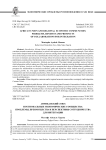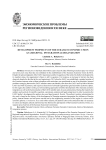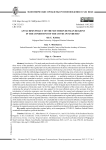Экономические проблемы регионоведения в XXI веке. Рубрика в журнале - Вестник ВолГУ. Серия: История. Регионоведение. Международные отношения

Статья научная
Introduction. African Union’s regional economic communities are stronghold for the African continent towards economic integration in various sub-regions and sectors of the African people. Their efforts have further deepen both trade and political interests among them which have equally boosted the integration drive of the African Union for the overall benefits of the Africans. Their moves have articulated many incentive, for more investments and attraction of Foreign Direct Investment that have brought continental reforms like stabilization, market policy, liberalization and privatisation methods adopted for regional arrangements to increase both private and public investments. Methods and materials. The paper adopts secondary source of data to elicit information while it makes use of the study towards economic, monetary market development and political union in African. Analysis and Results. The paper posits to examine their areas of dimensions, problems and prospects for collaboration to maximize economic goals and objectives which include security governance, economic growth, etc. The paper identifies problems like over concentration with the regional economic communities and their attendant peculiarities, while it notes the prospects of joint activities between the African Union and the regional economic Communities to build their capacities, harmonize and coordinate their institutions towards collaborations.
Бесплатно

Development propsects of the Eurasian Economic Union as a regional integrational organization
Статья научная
Introduction. It has been almost thirty years since the idea of forming Eurasian space was voiced and seven years since that idea was embodied in the establishment of the Eurasian Economic Union (EAEU). Despite the acknowledgment of the EAEU importance and the recognition of the need of its further development by its member states, the organisation’s future is still in question. For instance, an increase in barriers has been observed, despite the fact that at the very beginning in 2015 when the EAEU was established, a gradual creation of the Eurasian customs union without exceptions and restrictions was proclaimed as one of its principles. Internal problems emerging between the EAEU member states considerably slow down the EAEU activity both within the EAEU and with its partners, and require a discussion of a broader agenda that goes beyond the economic sphere. In this regard, the authors set the goal of researching approaches to further development of the Eurasian economic integration as well as the harmonization of the EAEU member states in socio-cultural area. During the research, the authors used methods of scientific cognition, consistency, analysis and legal comparison. In order to examine the EAEU bodies’ development the authors also used legal research. Results. The authors’ position substantiated in the work is based on the history of the development of Eurasian economic integration, the influence of foreign policy, internal factors and soft power carried out by the neighboring countries of the region in various socio- economic spheres. Conclusions. As a result of the research, the authors come to the conclusion that it is necessary to restore and deepen cultural and historical ties between the participants of the Eurasian Economic Union, as a separate area of activity of the Eurasian Economic Commission.
Бесплатно

Антикризисная политика южно-российских регионов в условиях пандемии COVID-19
Статья научная
Введение. В данном исследовании анализируется антикризисная политика южнороссийских регионов в период трех волн пандемии, а также оценивается характер ее изменения по мере развития коронакризиса. Важно было выявить, как региональная антикризисная политика определяет выбор механизмов и инструментов решения задач социально-экономического развития регионов. Методология и методы. Анализ проводился в соответствии с методологией, предложенной Г. Буккертом, по следующим направлениям антикризисного управления: мониторинг, обучение, принятие решений, координация, коммуникация, лидерство и восстановительный потенциал. Для проведения исследования были использованы методы: контекст-анализ - качественный анализ документов, принимаемых региональными властями; количественный анализ - анализ социально-экономических показателей, отражающих реакции экономики на решения, принимаемые региональными властями. Анализ. Исследование показало, что, независимо от силы воздействия коронакризиса и масштабов нанесенного ущерба, содержание политики региональных властей может быть охарактеризовано как «следование за центром», что во многом обусловлено стремлением избежать ответственности за последствия принимаемых решений. На первых стадиях развития коронакризиса в приоритете были цели сдерживания распространения коронавируса и государственная поддержка наиболее пострадавших отраслей экономики от введения ограничительных мер. Начиная со второй и последующих волн пандемии, ключевым направлением региональной политики стало введение разнообразных мер, связанных с массовой вакцинацией населения. Результаты. Выявлена ключевая проблема реализации мер региональной политики - неэффективная информационная работа региональных властей, что привело к информационной асимметрии с усилением влияния СМИ на социальные настроения граждан. Сделан вывод, что для увеличения эффективности мер реализации региональной политики в целях повышения устойчивости регионального развития важно, чтобы реализуемые координационные взаимодействия властей на разных уровнях управления имели четкие цели по восстановлению экономики регионов, а восстановительные меры должны быть приоритетно связаны с политикой поддержания предложения. Вклад авторов. А.Э. Калинина - разработка и обоснование концепции исследования, формирование его методологии, обобщение результатов исследования и формулировка выводов; И.В. Митрофанова - разработка дизайна исследования, проведение контекст-анализа документов, принимаемых региональными властями, интерпретация результатов исследования, оформление и редактирование рукописи; О.А. Чернова - сбор и систематизация данных, анализ и обобщение данных по научным источникам, проведение количественного анализа социально-экономических показателей, характеризующих реакции регионов на принимаемые региональными властями решения, работа с графическим материалом.
Бесплатно

